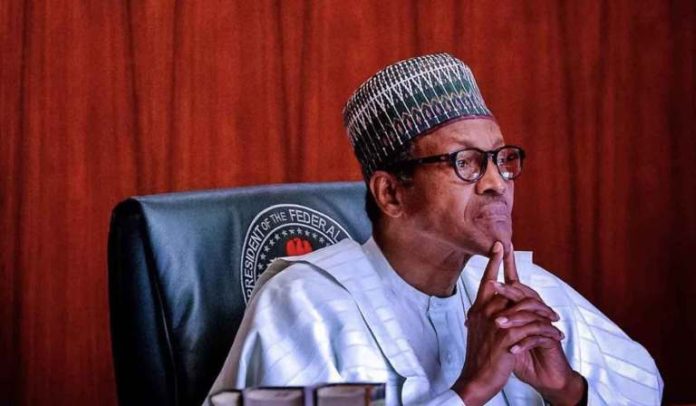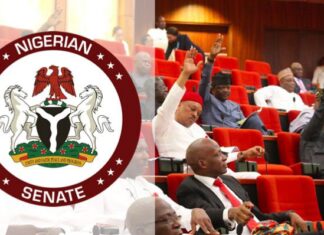By Emeka Alex Duru
Ordinarily, the matter should have been laid to rest, with the President, Muhammadu Buhari, stressing that he had no agenda at going for another term in office. While speculations trailed the subject, Buhari announced at a meeting of the National Executive Committee (NEC) of his All Progressives Congress (APC), that he had no intention to prolong his stay in office. In his words, ‘I am not going to make a mistake. Besides the age, I am not going to contest for third term because I will go by the Constitution. The Constitution says two-terms.”
Going by what his admirers flaunt as his trademark integrity capital, the matter should have ended at that. But the uncertain moves by a certain Charles Oko Enya, a businessman from Ebonyi State, to widen the controversy, is not helping his case.
Enya, the 2019 Organising Secretary of the President Buhari Campaign Organisation in Ebonyi State, had approached a Federal High Court in Abakaliki, praying it to remove the constitutional clause barring Buhari and State governors from contesting a third term. The Court is yet to make definite pronouncement on the issue. But the APC has disowned the campaigner, threatening to expel him from the party.
On account of the declaration by the President and the threat by the APC, the temptation may be strong to assume that the tenure elongation gambit is dead on arrival. The President, for one, is touted by his supporters as one not given to duplicitous tendencies. He is a soldier – a retired General, whose word should be his bond. Critics are however not convinced that the remarks by both Buhari and his party are strong enough to take to bank.
Enter the Hate Speech Bill
The move by the government at putting up a law against comments considered hate speech, is a major cause of concern to many on what lies ahead. On Tuesday, November 12, 2019 a Bill to Establish a Commission for the Prohibition of Hate Speeches found its way back in the Senate. The Bill titled, “National Commission for the Prohibition of Hate Speeches (Est, etc) Bill, 2019(SB.154) and sponsored by the Deputy Chief Whip of the Senate, Senator Aliyu Sabi Abdullahi (APC, Niger North), was read the first time at Plenary.
A similar Bill had been sponsored last year March by the Senator which stated that any person found guilty of any form of hate speech that results in the death of another person shall die by hanging upon conviction.
Femi Falana, human rights lawyer, has also identified incidences of arbitrariness on the part of the government, as indicators of the unfolding third term agenda. At a forum in Lagos, he had warned the media to rise up to the impending challenge. “The media must not be silenced. You may have a third term campaign soon. Very soon, they will all possible opponents. And by the time they bring in the third term agenda, the media would have been gone”.
A Senior Lecturer in the School of Mass Communication, Lagos State University, who pleaded not to be mentioned, also suspects something sinister in the hate speech bill. “I am see a red flag on the way. This is a sure move to seize the media. Many actions will then follow. Something is wrong somewhere”, he notes.
Efforts by the high officials of the government to dismiss the insinuations of impending third term, are not registering impacts with the people. The fear is that with the governors as co-beneficiaries of the agenda, the states will easily be recruited into the project. Also, unlike in the past when there was critical mass of opposition to moves by the government at embarking on unpopular programmes, there is no such unity of action, presently. The civil society and the Labour unions that had galvanized forces to call the government to order, are currently singing in discordant voices. Besides, the leading opposition political party, the Peoples Democratic Party (PDP), that should have provided robust platform for holding the federal government in check, has not adequately found its feet in playing the role.
How far can the President be trusted?
There is thus, the resort by casual interpreters of the fleeting situation to rely on the declaration by the President. Strong as that may be, his antecedents at sticking to his pronouncements may not offer much hope in that regard. In seeking office in 2015, Buhari had pledged to do one term if elected, arguing that age would not allow him go for second term. “I’m not getting younger. If I succeed and do one term, I will be 73 years old”, he had told media men. Four years later, the President was back on the block, asking for votes, claiming that he was responding to the clamour by Nigerians to re-contest in 2019. He had also at a time, vowed not to seek medical treatment abroad, as a President. This pledge has rather been kept in breach. Also, the promise to make open declaration of his assets, has not been kept. This is the dilemma confronting even his ardent admirers.
Haunted by the past
Incidentally, Nigeria has a sad history of undemocratic kites being flown in the past before the real onslaught on the people. In the botched tenure elongation project of the erstwhile Olusegun Obasanjo administration for instance, a theory of regime continuity to consolidate the alleged gains of the government was sold to Nigerians. While the controversy it generated thickened, Obasanjo, chose to dance on the topic with breezy explanation that he would not do anything that was unconstitutional. To actualize the agenda, his cronies in the National Assembly were instigated to go for constitution amendment. It took sheer determination and unity of purpose by Nigerians to halt the project when it had almost blossomed.
Earlier, the intrigues that eventually snowballed into the annulment of the June 12, 1993 elections, had commenced with odious demands by a nondescript organization, Association for Better Nigeria (ABN), headed by Senator Arthur Nzeribe, on the then military president, Ibrahim Babangida to extend the political transition time table of his government. Nzeribe and his cohorts were initially ignored by Nigerians as mere rabble rousers. By the time the enormity of their antics had been appreciated, they had procured a controversial midnight court injunction that Babangida latched on to annul the election.
The same trend by the same Nzeribe re-appeared in the succeeding Abacha regime in which the late General was sold the option of transforming to a civilian president. The scheme which originally seemed innocuous almost sailed through with the then existing five political parties adopting Abacha as their sole presidential candidate till he suddenly dropped dead on Monday, June 8, 1998.
This is why many are not comfortable by the moves by Enya. They are also not convinced by the declaration by Buhari. Apart from age, he spoke on the constitution as a limiting factor to the agenda. His treatment of the age factor in 2019, is still fresh, while Obasanjo’s surreptitious moves at changing the constitution to achieve his desire, is not yet lost on Nigerians. Buhari, Obasanjo, Babangida, Abacha, are, incidentally of military background.











